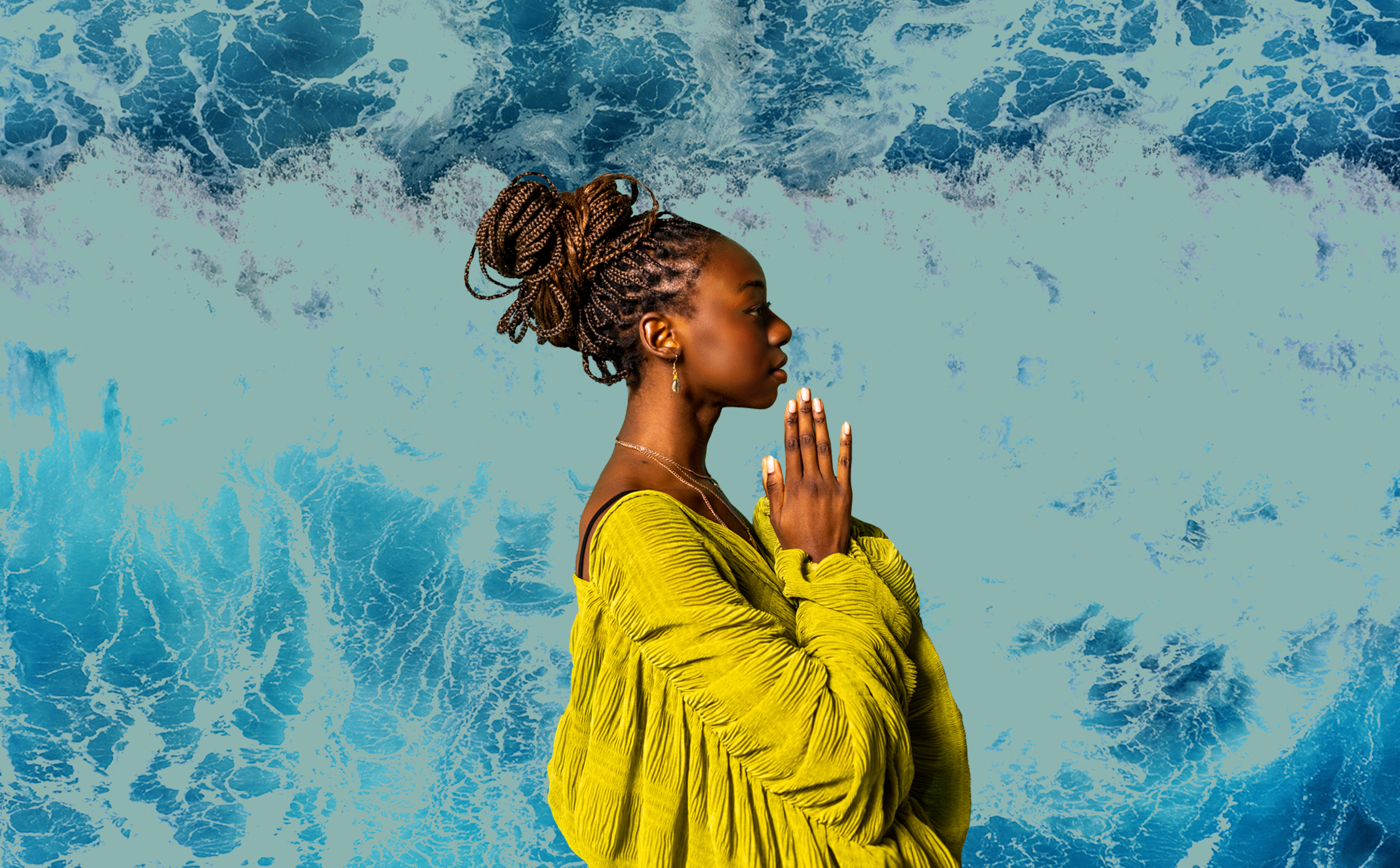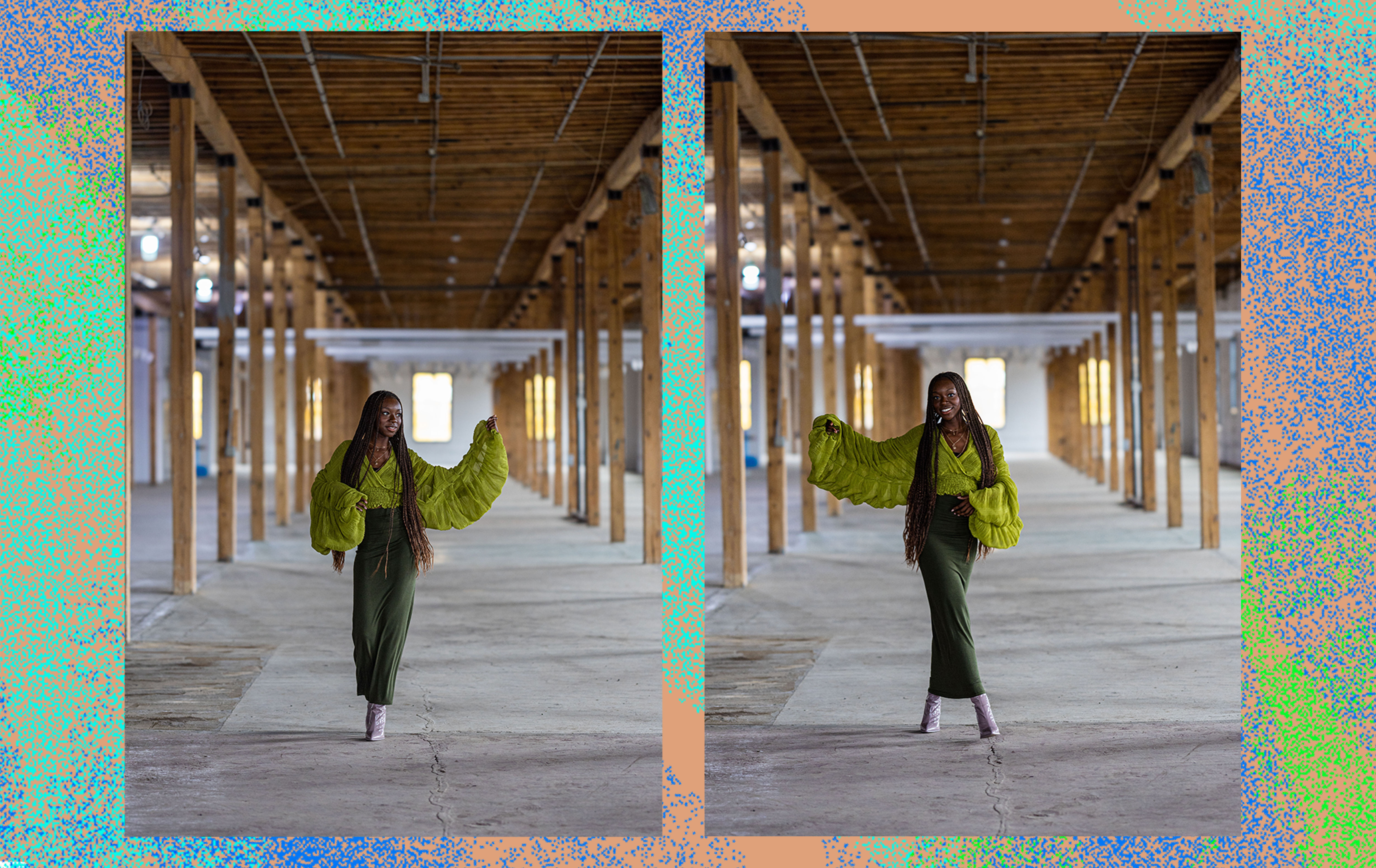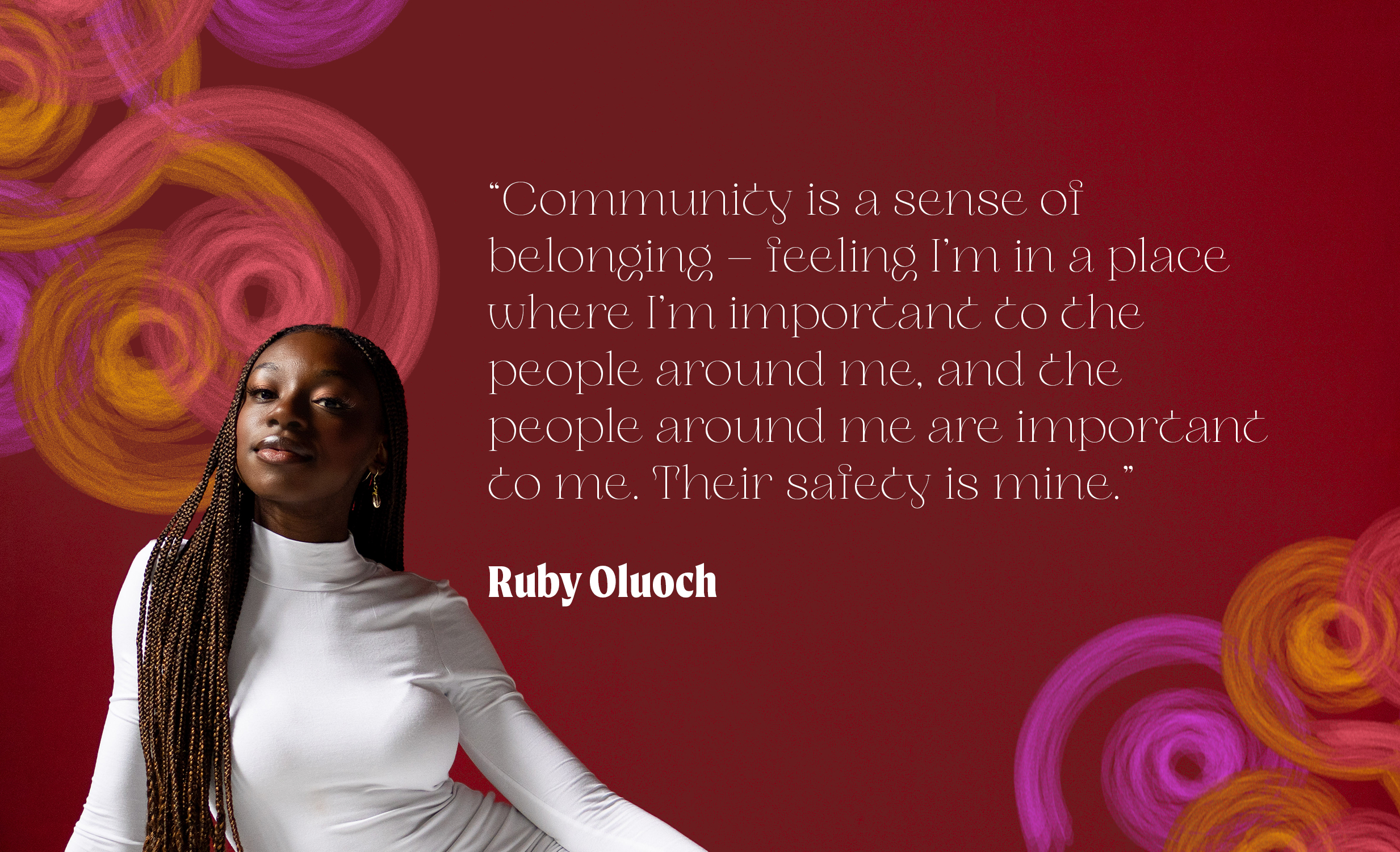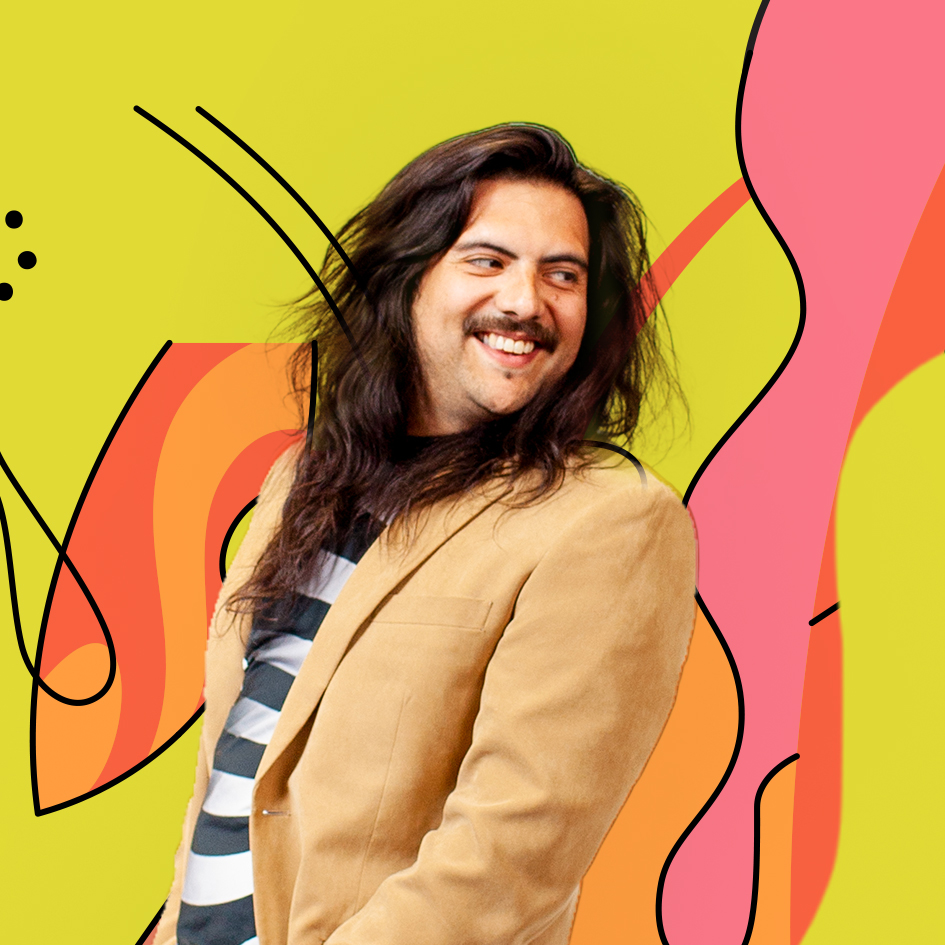

Ruby Oluoch joined Pollen in January of 2020. Since then, she’s been instrumental in shaping so many Pollen stories — from those of our partners through Pollen Studio, to Pollen’s own story of narrative change work. As she prepares to step into the Executive Director role in January of 2023, she sat down with Pollen Editorial Director Jerome Rankine to share some stories of her own: stories of life, leadership, and a vision for Pollen’s future.
Photography by Andrés Pérez

Where does your Minnesota story begin?
It started where I was born. My parents came to Minnesota from Kenya to continue their graduate studies at the U of M. So I was born at Riverside Hospital, and raised in the St. Anthony Park neighborhood of St. Paul.
I’ve always described it as the most idyllic, perfect childhood. I loved growing up there. Because it was graduate student cooperative housing, there were a lot of immigrants there, a lot of people from different cultures, walks of life, but the commonality was the university.
I felt very safe just being out and about. I would leave in the morning, and my parents wouldn’t see me all day. I’d be playing outside, I’d be playing with neighbors, and they didn’t have to worry. They knew I was looked after and that I was being taken care of, even when I wasn’t within their eyesight.
The most basic understanding of community to me is the idea that I’m only as well, or as safe, or as protected, or as valued as the least protected person in my community.
Community is a sense of belonging — feeling I’m in a place where I’m important to the people around me, and the people around me are important to me. Their safety is mine.
That idea has real roots in my childhood experience.
I moved around the metro a few times after those years, but ended up back in Minneapolis at the U of M for college.
What brought you to Pollen?
Very early on in my professional life I was drawn to media and communications because I had identified how powerful they are in shaping narratives, and I had also seen the ways that narratives had directly impacted my life.
But what was exciting about Pollen specifically was that Pollen’s approach to storytelling and design makes it hard not to pay attention. And it’s hard not to want to be a part of it! Pollen’s way of making these ideas and values highly engaging, really immersive, and very artful was attractive to me.
What has your experience working at Pollen been like?
It’s been a super positive experience. Because in addition to just being able to develop professional skills around art, creativity, messaging, social justice, and community engagement, I’ve also been able to benefit from a lot of personal development.
At Pollen I’ve been offered the emotional safety to take risks in my professional career, which means that I also take healthy risks in my personal life. It’s been healing to be valued as a complete and imperfect person at Pollen — beyond the labor that I provide.
I truly feel like I work with the smartest, most talented, creative, brilliant people, who are also extremely emotionally intelligent and supportive human beings. That feels special to me. I’m, like, “wow, how did this happen?”
What personal values will you be bringing to this role?
I’ll start with imagination. Imagination is something I value because of the power it has to open up our minds to different possibilities. It’s important for us, especially those of us who are always under the threat of violence, always under systems of domination, to understand that there are different ways to exist, different ways to govern, different ways to relate.
Creativity is natural, but imagination is a practice and an exercise that requires us to be a little bit more bold in our creativity. The ability to practice that with others or to push others to be more imaginative is something I hope my leadership will influence.
One of my strongest personal values is freedom, personal freedom. I understand personal freedom to be the ability to walk, talk, and be in this world without apology. And that’s something that I was only able to experience after beginning to unlearn and decondition myself from so many of the beliefs and narratives that influenced me.
And I feel like right now, I’m the most free I’ve ever been. I feel so free in myself and in my mind. And that’s important because we live in a world that is hard to feel free in. So I think of Toni Morrison’s quote: “Your real job is that if you are free, you need to free somebody else.”
And for some of us, there is really nowhere in the world you can go, that you might be able to feel totally free, so you must have that sense of freedom inside yourself, in your mind, in your spirit — because that’s what allows you to help other people free themselves, and then for all of us to get free.
One of my strongest personal values is freedom, personal freedom. I understand personal freedom to be the ability to walk, talk, and be in this world without apology.
Freedom work is hard work. How do you stay energized?
This sounds dramatic, but this is my life’s work.
So when I think about how I take care of myself while doing the work, I have started to complicate that question by understanding that there are ways for this work itself to be caregiving, healing.
One way I do that is considering some of my more embodied work as connected to justice work. I got certified as a yoga teacher this year and really invested in my education around both mindfulness and physical movement as tools to keep my body and spirit healthy for the long haul.
Travel is another mode of healing for me, when I can share what I know and bring back what I learn. I’m inspired by global freedom movements, so my time in Cuba, South Africa, Barbados and other black African countries have been a big part of my knowledge and information sharing. It adds to my reservoir of ideas when I’m able to have a new experience in a new environment. And reading also — I get access to ideas that recharge me.

What’s your vision for Pollen’s future?
One area Pollen’s going to continue to be influential is in narrative messaging, of course. Our ability to share and craft stories that put love, freedom, and justice at the center of the work is one of our superpowers. I honestly think Pollen’s work helps people remember what it’s like to be alive, to be a whole human. They read the stories, they experience the beautiful events or media, and they feel something change within them.
We understand that narrative power building is a team sport, and requires people from all areas of influence, governance, policy, artistry. In order to craft visions of future possibilities, we have to actually be in relationship with the people that are in our community working toward those visions. And we still have a lot of people to get to know. An area of growth for Pollen is looking hard at who hasn’t been involved in our work.
I’m really passionate about the work that’s happening in Minneapolis, influencing broader, national conversations about policing, voting rights, housing. I want to be sure that Pollen can be trusted with communicating what is happening in Minneapolis and in our region — working with other organizations and other individuals to shape that story – because it has major implications for what we and others will consider possible for our futures.
We’re going to keep growing our artist and freelancer communities too, to be a place where artists and writers want to work, and want to see their work featured.
And now that we are becoming more comfortable convening again, I’m looking forward to thinking about the ways that Pollen creates a sense of belonging in our community. One of the things that draws people to Pollen is that we create spaces where you can be vulnerable, you can be scared, you can be confused, you can feel like you don’t know, and that is welcomed. And you’re offered hope, you’re offered optimism, you’re offered color and vibrancy as well. You’re offered the freedom to feel everything.
I feel like one of the biggest flexes you can have as an organization is to be self-referential of the work you did from the past as informative to the culture now. So as part of Pollen’s future, I want us to be more proud of, or louder about our influence on the sector. I’ve seen the impact, and I’m confident that it’s going to continue to happen.

Contributors

